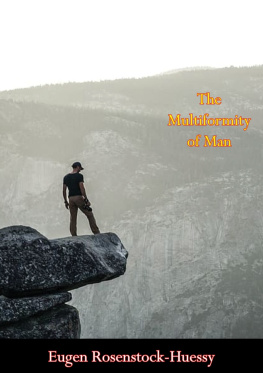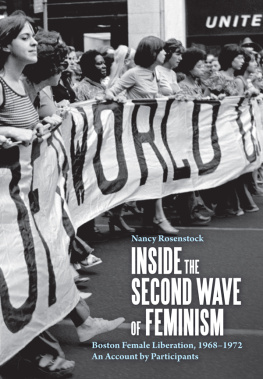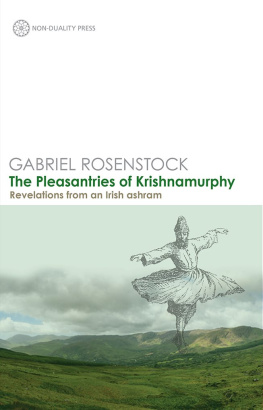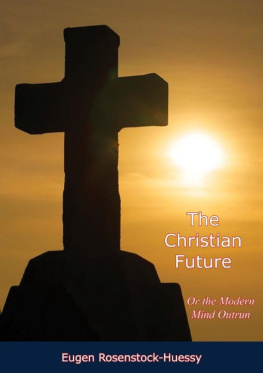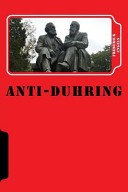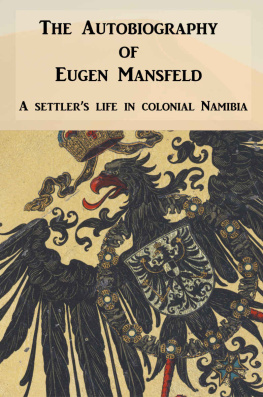Rosenstock-Huessy Eugen - The Multiformity of Man
Here you can read online Rosenstock-Huessy Eugen - The Multiformity of Man full text of the book (entire story) in english for free. Download pdf and epub, get meaning, cover and reviews about this ebook. year: 2020, publisher: Barakaldo Books, genre: Science. Description of the work, (preface) as well as reviews are available. Best literature library LitArk.com created for fans of good reading and offers a wide selection of genres:
Romance novel
Science fiction
Adventure
Detective
Science
History
Home and family
Prose
Art
Politics
Computer
Non-fiction
Religion
Business
Children
Humor
Choose a favorite category and find really read worthwhile books. Enjoy immersion in the world of imagination, feel the emotions of the characters or learn something new for yourself, make an fascinating discovery.
- Book:The Multiformity of Man
- Author:
- Publisher:Barakaldo Books
- Genre:
- Year:2020
- Rating:5 / 5
- Favourites:Add to favourites
- Your mark:
- 100
- 1
- 2
- 3
- 4
- 5
The Multiformity of Man: summary, description and annotation
We offer to read an annotation, description, summary or preface (depends on what the author of the book "The Multiformity of Man" wrote himself). If you haven't found the necessary information about the book — write in the comments, we will try to find it.
The Multiformity of Man — read online for free the complete book (whole text) full work
Below is the text of the book, divided by pages. System saving the place of the last page read, allows you to conveniently read the book "The Multiformity of Man" online for free, without having to search again every time where you left off. Put a bookmark, and you can go to the page where you finished reading at any time.
Font size:
Interval:
Bookmark:


Barakaldo Books 2020, all rights reserved. No part of this publication may be reproduced, stored in a retrieval system or transmitted by any means, electrical, mechanical or otherwise without the written permission of the copyright holder.
Publishers Note
Although in most cases we have retained the Authors original spelling and grammar to authentically reproduce the work of the Author and the original intent of such material, some additional notes and clarifications have been added for the modern readers benefit.
We have also made every effort to include all maps and illustrations of the original edition the limitations of formatting do not allow of including larger maps, we will upload as many of these maps as possible.
The Multiformity of Man
BY
EUGEN ROSENSTOCK-HUESSY
Table of Contents
Contents
We are faced with the task of writing a foreword for a book that, in an earlier printing, has been called rugged, original and stirring. You, dear Reader, may be surprised to know that this very reception poses our dilemma. Because we can only publish this book if some people will put their abstract compliments aside to ask: What demands are now placed on me, what new responsibilities must I encompass in the new world of which this book writes?
When the best a reader of this book can say is that it is an interesting idea, he takes it for granted that word and act, faith and work are split. Now the power of this book lies in the unity of word and actour present division between theory and practice kills the power of a thinker or writer to reveal the context in which our acts become meaningful. Ideas are not theory when they are enacted by the men who think them. If the equality of all men were simply an idea, you can be sure that there would be no equality of men. If God is only an idea, you can be sure that there is no God. And if this book offers a readymade solution, it is unnecessary. A solution deserves a hearing only when a man makes it the theme of his life; otherwise the right to think is a mere luxury, a playing with ideas. This stringent requirement limits our real authorities by demanding an existential approach to any social problem. A man receives the power to leave the dry well at which this generation is asked to drink when he believes that there are those who yearn for a new spring.
Let us speak for a generation that is fed on techniques, getting ahead, how to win friends, how to meet the right people. We are told that we must have a plan which first takes care of our practical needs and then leaves man to do whatever else he desires. The only difficulty is that more and more younger people feel that the various opportunities offered by business and the professions arent quite good enough or interesting enough. The spark of adventure seems to go out. In industry the businessman has become increasingly resentful of a worker whose only relationship to the business is the desire to get as much money as possible. This is something new for America: a deep uncertainty of what to do complemented by an obsession with games, amusements and long Sunday rides.
This feeling of uncertainty was certainly lacking after World War I. The American returned to the unchanged world of free enterprise with its belief in progress and ones own private faith and independence of thought, while the colleges strove toward developing those qualities of self-reliance and broadness of outlook which would allow men to enter the community and the world as public minded citizens. This was excellent as far as it went; then it seemed that America could continue to live by herself.
We have been told that the distinguishing feature of this faith, related to the world of economics, is the capitalistic system. However, it has been ignored that the organic center of capitalism has two tenets which have nothing to do with a way of producing goods. The first of these is that capitalism was introduced into America by people who identified their life with their work, who worked until the job was done without clock-watching. The work of a man encompassed his jobs, and no good men today in management have a forty-hour week. Thomas Edison expressed this conviction when he said: I am glad the eight-hour day hadnt been invented when I was a young man. If my life had been made up of eight-hour days I do not believe I would have accomplished very much. This country would not have amounted to as much as it does if the young men of fifty years ago had been afraid they might earn more than they were paid.
The marrow of capitalism also contained a faith in bigness, bigger is better, and under this impulse organizations like General Motors and Bethlehem Steel have created miracles of production. But bigness was admired because the man himself could surpass what was considered big.
This core of the capitalistic faith has not been inherited by a generation shocked by another world war into the consciousness of a broken-hearted world. A new faith can not be built in the old fashion. The bigness of corporations scares the newcomer today and efficiency, the keynote of business, is insufficient without the stick-to-itiveness of the pioneer. Efficiency without roots has been transmitted to the new generation and today the something-for-nothing philosophy dominates even the most important decisions. Examples are numerous. One concerns a student who, offered a fellowship at two universities, frankly stated that he calculated the traveling expenses, the amount of money he would receive from each, and the relative importance of each degree. And how about the necessity of what he would study? Oh, a topic would be given to him at the school.
When a man has lost his roots in the soil of his work, his life him lost its necessity. Today every businessman knows how much time is wasted by trips to the washroom and waiting for the clock to sound. Theodore Mommsen, the great Roman scholar, once wrote: When man no longer finds enjoyment in work, and works merely in order to attain as quickly as possible to enjoyment, it is a mere accident that he does not become a criminal. Tired people admit that they only have a job. Is it enough to have a job that pays so much an hour? Is the dignity of the individual present in the factory? And is this not perhaps the source of the incompleteness which plagues our life and which no emoluments, football games or cocktail parties relieves? The modern worker along with a whole society under the pressure of an industrial system becomes more rootless, his relationships become transient, his love sex, his work just a job.
Most people seem to forget that this questionWhat is the destructive character of our economy?was raised by a man who in 1883 died as a complete worldly failure. His experience in the cotton mills of England led Karl Marx to the conclusion that capital exploits labor and the argument over this thesis is still carried on. This is hardly comprehensive enough today because obviously sometimes capital exploits labor and sometimes labor exploits capital. The destruction in society is now more inclusive. However, Marx did leave to us this one Question ignored by the communists which, if we respect it, allows us to move in a positive direction instead of wasting our time with long polemics on capitalism versus communism. Neither is adequate by itself. The real issue is mans freedom in a mechanized world. Will our economic thinking being with economic man, the labor force, or with the whole man, not only as the producer of goods but as the reproducer of his society?
Next pageFont size:
Interval:
Bookmark:
Similar books «The Multiformity of Man»
Look at similar books to The Multiformity of Man. We have selected literature similar in name and meaning in the hope of providing readers with more options to find new, interesting, not yet read works.
Discussion, reviews of the book The Multiformity of Man and just readers' own opinions. Leave your comments, write what you think about the work, its meaning or the main characters. Specify what exactly you liked and what you didn't like, and why you think so.

